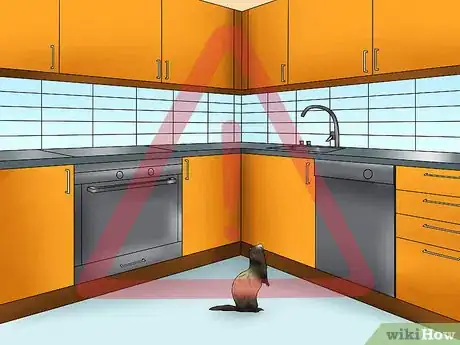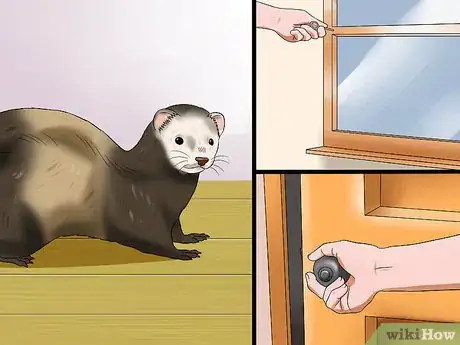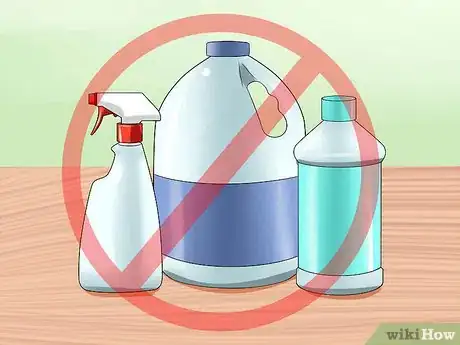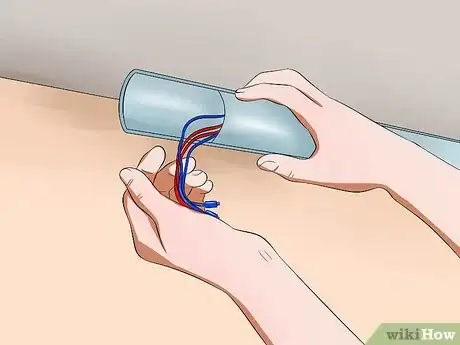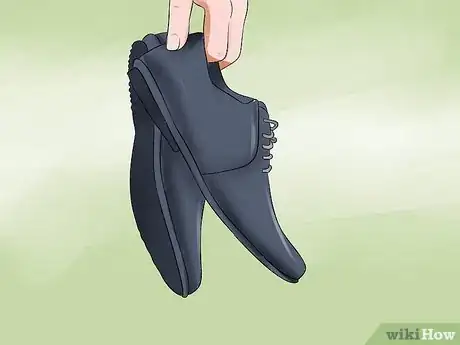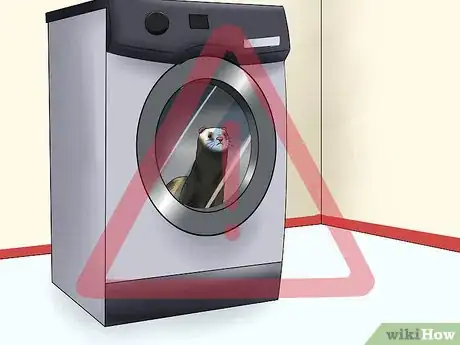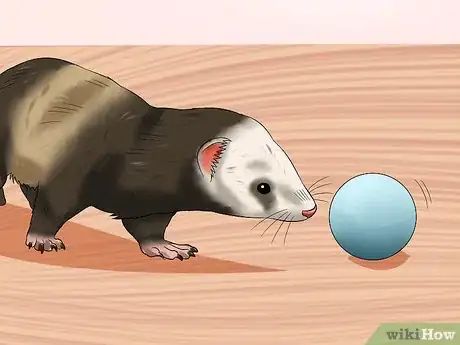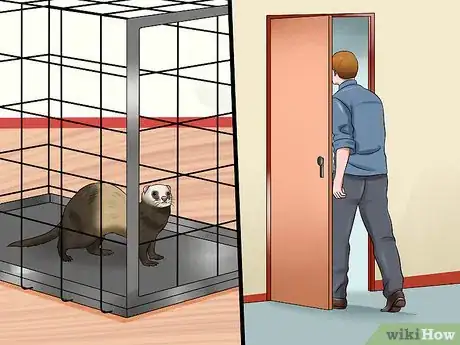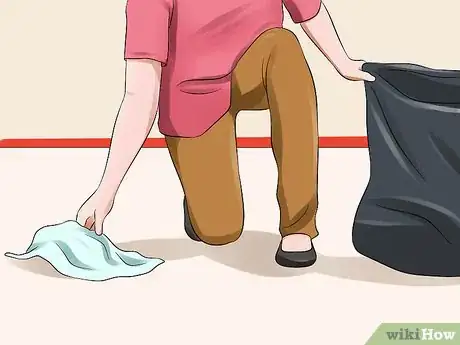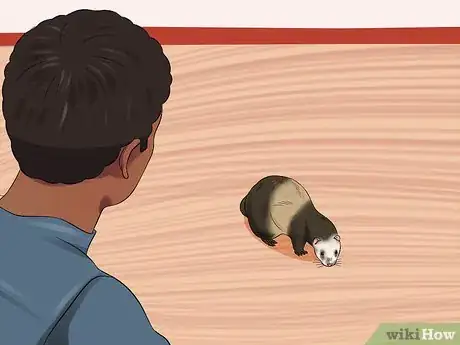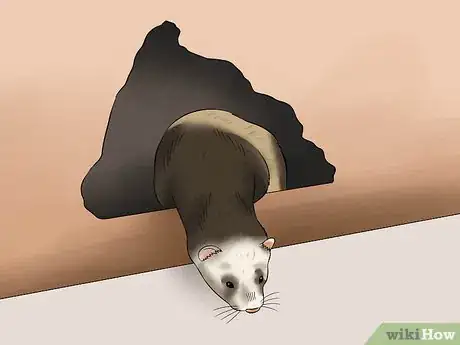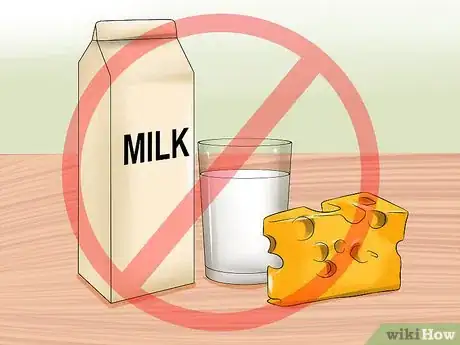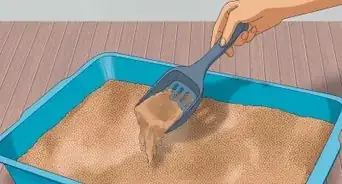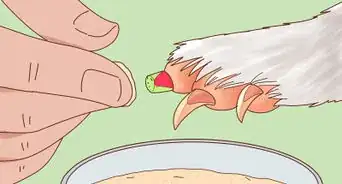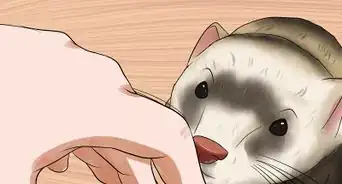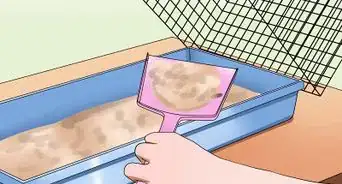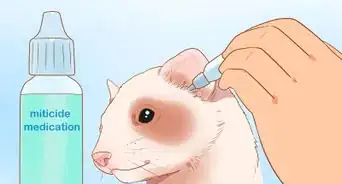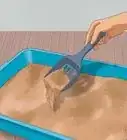This article was co-authored by Pippa Elliott, MRCVS. Dr. Elliott, BVMS, MRCVS is a veterinarian with over 30 years of experience in veterinary surgery and companion animal practice. She graduated from the University of Glasgow in 1987 with a degree in veterinary medicine and surgery. She has worked at the same animal clinic in her hometown for over 20 years.
There are 12 references cited in this article, which can be found at the bottom of the page.
This article has been viewed 43,025 times.
Ferrets are wonderful little creatures. They are very entertaining, mischievous, and form a close bond with their owners. However, owning one takes a lot of responsibility, and an important part of keeping your little friend safe and happy is making sure he or she can't escape or harm himself or herself with things in your house. This should be done before even going to purchase a ferret, and is especially important if your friend is free to go about the entire house as he or she pleases.
Steps
Creating an Environment that is Escape Free and Ferret Friendly
-
1Determine where your ferret will roam. The first thing you need to do is determine what areas of your home your ferret will be able to roam freely in. Once you decide this, you’ll then be able to focus most of your energies on making sure these rooms are safe and can contain your ferret from escaping. Most of your efforts will focus on making sure that there are no dangers or easy escape routes that will enable your friend to get out of your home.
- Pick an area of your home that is easy to block off.
- Consider a bonus room or a master suite in which you can close the door.
- Avoid high-hazard places like the garage, kitchen, or laundry room.[1]
-
2Block all escape routes. While you’ve already done some work ferret-proofing the area that your ferret will roam in, now you need to make sure that all escape routes in your home are blocked. The reason you need to do this is that although the area you’ve cordoned off is now safe, your ferret could still find his or her way into the other areas of your house. From there, freedom could be as easy as a doggie door or an open window.
- Make sure all doors shut correctly.
- Close all windows and other entrances into your home.
- Repair any structural problems that could offer your ferret a way out of your home. [2]
Advertisement -
3Identify chemical hazards. Chemical hazards are one of the most common dangers to dogs, cats, babies, and of course ferrets. In order to protect your friend from these hazards, make sure your home is chemical free. After all, the danger of your ferret ingesting a chemical is much scarier than the work it would take to remove chemical hazards from your home.
- Remove poisons and pesticides.
- Secure household cleaning products in a closet or cabinet that your ferret can’t access.
- Secure garden fertilizers and similar chemicals so that your ferret can’t get into them. [3]
-
4Fix any electrical hazards. Electrical hazards might be one of the biggest dangers to your friend. This is because as very curious little animals, ferrets will explore and even chew on things in order to figure out what they are. In order to avoid danger to your ferret, scout out any potential electrical hazards and fix them.
- Coat electrical cords with a bitter solution to repel chewing.
- Wrap electrical cords with electrical tape or other appropriate material to provide an extra layer of protection.
- Hook the cords to the wall about a foot or two from the ground.
- Plug up any vacant outlets with protectors.[4]
-
5Pick up anything that you don’t want destroyed. If there are certain things you really care about and don’t want chewed on, pick them up. While ferrets are not really destructive animals, sometimes (depending on age and other conditions) they might chew on plastic, rubber, or even wood.
- Pick up new shoes.
- Move or box up collector’s items or children’s toys that you don’t want damaged.
- Pick up expensive clothes.[5]
-
6Anticipate common dangers. Household appliances represent huge and common dangers to ferrets that ferret owners should be aware of. This is because many appliances in our homes offer warm places to explore and are easy to get into. In addition to climbing inside the back of an appliance, there are a variety of other appliance-related dangers. Consider:
- That your ferret might like to sleep in dirty laundry and can easily get thrown in the washer or dryer by accident.
- Always checking inside your dishwasher or oven before running them.
- Making sure your ferret can’t get inside the back of your refrigerator or freezer.
- Securing any large appliances that might have holes small enough for your ferret to climb inside.[6]
-
7Provide your ferret with toys and entertainment. One way to keep your ferret out of trouble is to keep him or her occupied. The best way to do this is to provide your friend with toys and other things to play with. Consider:
- A ferret maze. Ferrets are very inquisitive and like to explore and play. Buy or build a maze for your ferret to play in. You can purchase one at a pet store or build one out of cardboard or other materials.
- Buying your ferret balls, crinkle toys, or other plastic toys to chew on.
- Playing with your ferret and find out what he or she likes to do. This way, you'll be in a better position when it comes to supplying your ferret with toys.[7]
Protecting Your Ferret From Dangers Posed by People and Pets
-
1Talk to everyone who lives in your home. Communicating with everyone you live with is extremely important in ferret-proofing your home. Although you’ve gone out of your way to make your home safe for your little friend, other people (if they are careless) could easily undermine all of your work. Make sure to:
- Talk to roommates or family about your ferret and things that pose a danger to him or her.
- Explain to your roommates and family about how your ferret could easily get out if they don’t close doors and windows.
- Remind your roommates and family of your efforts to ferret proof the house every couple of weeks – so they don’t forget or get lazy.
- Put up signs to remind people that your home is a ferret-friendly zone.[8]
-
2Put your ferret away when people come to visit. One of the most common ways that ferrets get out of people’s homes is when there are visitors who don’t realize how important it is to close doors after themselves. As a result, whenever you have visitors to your home, make sure you put your ferret away. This will help you avoid the horrible situation of a friend accidentally letting your ferret slip outside.
-
3Gather garbage or small pieces of plastic. Take some time to remove small hazards that you or your family might leave around the home. This, though, will really be an on-going battle as you and your family will constantly be creating small hazards for your ferret. The biggest dangers to consider are:
- Small pieces of plastic that your ferret might chew on and swallow.
- Garbage with food on it that might be toxic to your ferret.
- Garbage like aluminum cans and plastic that could injure your friend if he or she were to investigate it.[9]
-
4Avoid letting your ferret play with other pets. While it may be tempting to let your ferret roam freely in the same area of your home as your dog or cat, this could be extremely dangerous for the ferret. As a small animal, ferrets are extremely vulnerable to larger pets – especially cats – who have well-developed predator instincts. In addition, ferrets are not harmless themselves. They’re actually very capable hunters and can deal out considerable damage to larger animals.
- Set aside a room or part of your house just for the ferret. Restrict other animals from this area.
- If you think your ferret needs a companion, consider another ferret.
- If you must let your ferret and another pet roam together, make sure to introduce them slowly and then monitor their interactions very carefully.
- Never leave your ferret and another pet unattended while you are not at home.[10]
Learning About Ferrets
-
1Monitor your ferret closely. When your ferret is freely exploring your home, you should monitor he or she closely. Watch where he or she goes. Take note of his or her favorite places to hide or to play in. Chances are, your ferret will wind up in places you never considered.
- After watching your friend, make sure that any places you’ve neglected to ferret-proof are now safe.
- Consider re-thinking the area that you’ve ferret-proofed if your ferret finds clever ways to escape or get into trouble. After all, a little work is worth avoiding the heartbreak of losing your little friend.
- Tell your friends and family about places your ferret likes to go. This could be extra important if your friend likes to crawl into a couch, arm chair, or go behind a door.
-
2Understand that ferrets are very small and agile. Ferrets are very small and agile. They’re not like dogs and cannot be restricted or penned up the way dogs are. As a result, you need to be aware of your ferret’s capabilities and what they can and cannot do. Knowing your ferret’s capabilities may save you a lot of time when it comes to ferret-proofing your home.
- Ferrets will climb walls, fences, or other obstacles to get where they want to go.
- Ferrets are very small and get through cracks under doors and other spaces that you really wouldn’t expect.
- Ferrets can also be very adept jumpers and can jump from a table to another table, down stairs, or more.[11]
-
3Provide a litter box. Ferrets can be litter trained just like cats. As a result, one aspect of ferret-proofing your house is to make sure your ferret does not mess in your home. In order to avoid this, make sure to provide your ferret a litter box and to litter train your little friend. By litter training your ferret, you’ll avoid potential messes and make your ferret a much more well-adjusted member of your family.
- When your ferret is young, and is not house trained, make sure to put litter and a litter tray in your ferret’s cage.
- When your ferret messes outside of the litter tray, move his or her mess into the tray.
- Clean the litter tray at least once a week.[12]
-
4Learn about foods that are dangerous to ferrets. There are a variety of household foods that, if consumed, can harm your ferret. These foods are foods that people commonly consume and might be left out in the open on a regular basis. When you add a free-ranging ferret to this, you have a potentially dangerous combination that could result in your ferret going to the vet. Avoid:
- Dairy products. Ferrets can't digest dairy. Keep dairy away from them at all costs.
- Garlic and onions.
- Sugar.
- Fruits and vegetables.
- Grains, when possible. Some ferret food will contain grain. This is okay.[13]
References
- ↑ https://www.vetbabble.com/small-pets/ferrets/ferret-proofing/
- ↑ http://articles.extension.org/pages/73671/ferret-household-hazards
- ↑ http://www.humanesociety.org/animals/resources/tips/common_household_dangers_pets.html
- ↑ https://www.vetbabble.com/small-pets/ferrets/ferret-proofing/
- ↑ http://animals.mom.me/ferrets-chew-1732.html
- ↑ http://www.ferretuniverse.com/care/ferret_proofing.asp
- ↑ http://www.ferret-world.com/homemadeferrettoys.html
- ↑ https://all-about-ferrets.com/beware-of-guests-stupid-roommates-and-watch-your-ferrets-like-a-hawk.html
- ↑ http://www.all-about-ferrets.com/ferret-proofing.html
About This Article
To create a safe environment for your ferret, determine which parts of the house it will have access to. For example, you might limit the ferret to a single room that you can easily block off. Limit access to hazardous areas, like the kitchen or garage. Once you’ve designated an area, check for any possible escape routes, such as doors or windows, and block them off. Look around for any hazards, such as toxic household chemicals or loose wires, and put them out of your ferret’s reach. You should also put away anything you don’t want your ferret to chew on or destroy, like shoes and knick knacks. If your ferret has access to any appliances, make sure it can’t get into, behind, or under them. For more tips from our Veterinarian co-author, including how to protect your ferret from other people and pets in your home, read on!
